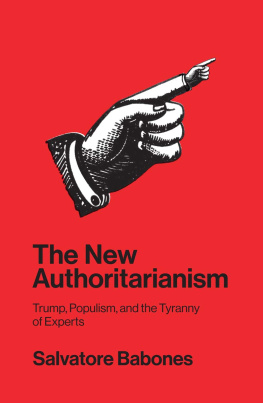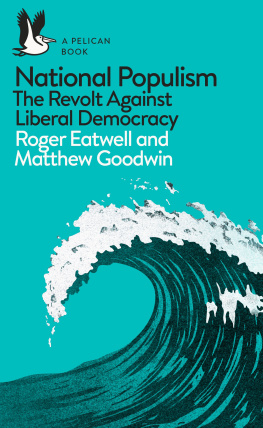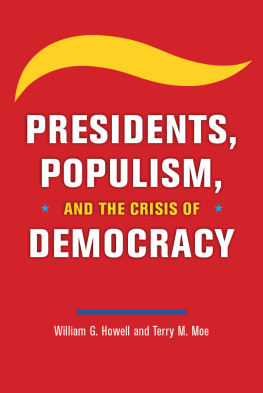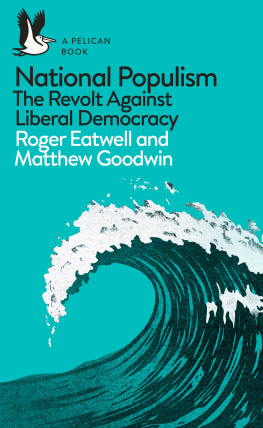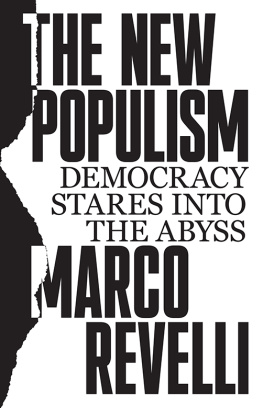Contents
Guide
Pages

The New Authoritarianism
Trump, Populism, and the Tyranny of Experts
Salvatore Babones
polity
Copyright Salvatore Babones 2018
The right of Salvatore Babones to be identified as Author of this Work has been asserted in accordance with the UK Copyright, Designs and Patents Act 1988.
First published in 2018 by Polity Press
Polity Press
65 Bridge Street
Cambridge CB2 1UR, UK
Polity Press
101 Station Landing
Suite 300
Medford, MA 02155, USA
All rights reserved. Except for the quotation of short passages for the purpose of criticism and review, no part of this publication may be reproduced, stored in a retrieval system or transmitted, in any form or by any means, electronic, mechanical, photocopying, recording or otherwise, without the prior permission of the publisher.
ISBN-13: 978-1-5095-3311-4
A catalogue record for this book is available from the British Library.
Library of Congress Cataloging-in-Publication Data
Names: Babones, Salvatore J.
Title: The new authoritarianism : Trump, populism, and the tyranny of experts / Salvatore Babones.
Description: Cambridge, UK ; Medford, MA : Polity, 2018. | Includes bibliographical references and index.
Identifiers: LCCN 2018004119 (print) | LCCN 2018018426 (ebook) | ISBN 9781509533114 (Epub) | ISBN 9781509533084 (hardback) | ISBN 9781509533091 (paperback)
Subjects: LCSH: Liberalism. | Populism. | Democracy. | BISAC: SOCIAL SCIENCE / Sociology / General.
Classification: LCC JC574 (ebook) | LCC JC574 .B32 2018 (print) | DDC 320.56/62--dc23
LC record available at https://lccn.loc.gov/2018004119
The publisher has used its best endeavors to ensure that the URLs for external websites referred to in this book are correct and active at the time of going to press. However, the publisher has no responsibility for the websites and can make no guarantee that a site will remain live or that the content is or will remain appropriate.
Every effort has been made to trace all copyright holders, but if any have been inadvertently overlooked the publisher will be pleased to include any necessary credits in any subsequent reprint or edition.
For further information on Polity, visit our website: politybooks.com
Preface
What happened? Posed as a rhetorical question, the title of Hillary Clintons election memoir manifests the confused anguish of the global expert class over the election of Donald J. Trump to the Presidency of the United States. Had Clinton lost to Bernie Sanders or a generic alternative Republican, the world would not have stood still. But it did stand still for President Trump. Experts of all kinds decry his lack of qualifications, recoil at his speech and behavior, and warn of the gathering threat to the future of democracy. Trump is crass, certainly. But a threat to democracy? Trump is a populist and a boor, but he is no dictator. And his time in office has been anything but a march to crush all opposition: the Republican Congress cant decide whether to work with him or against him and a hostile judiciary routinely challenges his every order. If Trump is a dictator, he is not a very good one. Overall, his administration is probably best described as beleaguered rather than tyrannical.
The closest the United States has ever come to a true populist tyranny was the Presidency of Andrew Jackson (18291837). The modern Democratic Party was born in the election of 1828 with Jackson at its head. The Nashville patriarch Jackson, a war hero, Indian fighter, property developer, and largescale slave owner, won a landslide victory over the Boston patrician John Quincy Adams. The incumbent President Adams was like George W. Bush, Barack Obama, and Hillary Clinton all rolled into one: the son of a President, a Harvard professor, and a former Secretary of State. No one was more qualified to be President than he was. But Jackson had the charisma and the votes.
Jackson portrayed himself as a man of the people, and the crowds at his inauguration really were the largest ever recorded at the time. After taking the oath of office, he rode his own horse to the White House, where he threw the doors open to the public. Once in power, he vetoed a bill that would have reauthorized the Bank of the United States (the nineteenth-century equivalent of the Federal Reserve), earning the wrath of the financial establishment. To maintain his popularity, Jackson forcibly dispossessed Native Americans, fought a proxy war with Mexico over Texas, and conspired to repress the freedom of speech of anti-slavery activists. Through such policies he won reelection with a second landslide victory in 1832.
It is hard to imagine Trumps Mar-a-Lago ever becoming a site of tourist pilgrimage like Jacksons former slave plantation, the Hermitage. Nor is it easy to imagine Trump riding a horse to work on his first day in office, even if his Secretary of the Interior did. Yet despite being labeled King Andrew by his opponents, Jackson respected the two-term tradition set by George Washington and did not run for the third term that he surely would have won (the Twenty-Second Amendment limiting Presidents to two terms was still more than a century in the future). The United States Constitution and system of government held firm, and Jacksons hand-picked successor, Martin Van Buren, was booted out after one term.
Jackson was vilified by the liberal Whigs of his day, but Jacksonian Democracy has come down to us as a byword for the idea that government is controlled by the people and that a nation exists to serve its citizens, in the words of Donald Trumps inaugural address. Though such populist demands are often dismissed by political theorists as leading to a degenerate majoritarian form of democracy, ordinary people might be forgiven for assuming that the whole point of democracy is majority rule. Majority rule, the populist core of Jacksonian Democracy, does not imply any particular policy platform. It merely implies that the people be placed at the center of the political process. It is the demand of the disenfranchised that they be heeded and heard. As with Jackson, so with Trump.
Democracy is, in Abraham Lincolns words, the government of the people, by the people, for the people. Much repeated, Lincolns mantra is little understood. It encapsulates, in one slogan, the strengths of three different political traditions. Government of the people, of the whole people in a single unified nation, is at the heart of conservatism. Government by the people, ensuring all people their due share in their own government, is at the heart of liberalism. And government for the people, for the benefit of the great majority of the people, is at the heart of progressivism. In balance (and in tension), conservatism, liberalism, and progressivism all contribute to the health and vitality of democracy.
Out of balance, they can destroy it. Over time, liberalism has evolved from a philosophy of individual freedoms balanced by the freedoms of others into a philosophy of individual rights that take precedence over those of the democratic polity itself. Ensuring all people the right to share in their own government is certainly a good thing, but once a privilege is defined as a right it slips out of the realm of democratic decision-making and into the realm of personal entitlement. As the list of such unalienable rights grows, the power to govern for the people slips out of the hands of the people and into the hands of experts, the experts who through education, social status, or sheer rhetorical agility are able to gain for themselves the authority to define those rights. The authority to identify new rights in effect gives its holders the power to define the limits of democracy itself. This authority forms the basis for the new authoritarianism of the books title.

